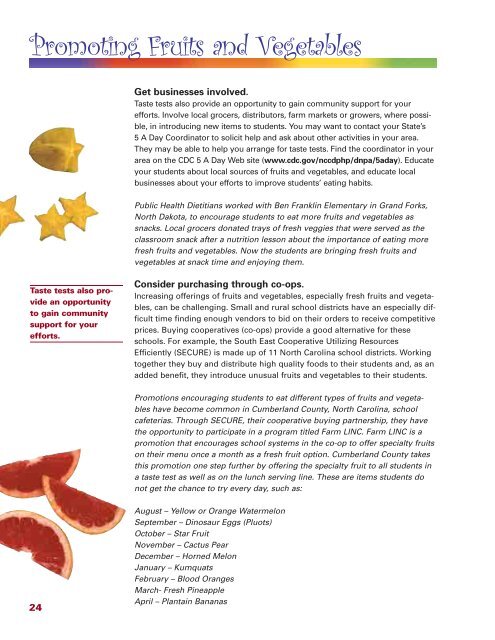meal_appeal
meal_appeal
meal_appeal
You also want an ePaper? Increase the reach of your titles
YUMPU automatically turns print PDFs into web optimized ePapers that Google loves.
Promoting Fruits and Vegetables<br />
Get businesses involved.<br />
Taste tests also provide an opportunity to gain community support for your<br />
efforts. Involve local grocers, distributors, farm markets or growers, where possible,<br />
in introducing new items to students. You may want to contact your State’s<br />
5 A Day Coordinator to solicit help and ask about other activities in your area.<br />
They may be able to help you arrange for taste tests. Find the coordinator in your<br />
area on the CDC 5 A Day Web site (www.cdc.gov/nccdphp/dnpa/5aday). Educate<br />
your students about local sources of fruits and vegetables, and educate local<br />
businesses about your efforts to improve students’ eating habits.<br />
Public Health Dietitians worked with Ben Franklin Elementary in Grand Forks,<br />
North Dakota, to encourage students to eat more fruits and vegetables as<br />
snacks. Local grocers donated trays of fresh veggies that were served as the<br />
classroom snack after a nutrition lesson about the importance of eating more<br />
fresh fruits and vegetables. Now the students are bringing fresh fruits and<br />
vegetables at snack time and enjoying them.<br />
Taste tests also provide<br />
an opportunity<br />
to gain community<br />
support for your<br />
efforts.<br />
Consider purchasing through co-ops.<br />
Increasing offerings of fruits and vegetables, especially fresh fruits and vegetables,<br />
can be challenging. Small and rural school districts have an especially difficult<br />
time finding enough vendors to bid on their orders to receive competitive<br />
prices. Buying cooperatives (co-ops) provide a good alternative for these<br />
schools. For example, the South East Cooperative Utilizing Resources<br />
Efficiently (SECURE) is made up of 11 North Carolina school districts. Working<br />
together they buy and distribute high quality foods to their students and, as an<br />
added benefit, they introduce unusual fruits and vegetables to their students.<br />
Promotions encouraging students to eat different types of fruits and vegetables<br />
have become common in Cumberland County, North Carolina, school<br />
cafeterias. Through SECURE, their cooperative buying partnership, they have<br />
the opportunity to participate in a program titled Farm LINC. Farm LINC is a<br />
promotion that encourages school systems in the co-op to offer specialty fruits<br />
on their menu once a month as a fresh fruit option. Cumberland County takes<br />
this promotion one step further by offering the specialty fruit to all students in<br />
a taste test as well as on the lunch serving line. These are items students do<br />
not get the chance to try every day, such as:<br />
24<br />
August – Yellow or Orange Watermelon<br />
September – Dinosaur Eggs (Pluots)<br />
October – Star Fruit<br />
November – Cactus Pear<br />
December – Horned Melon<br />
January – Kumquats<br />
February – Blood Oranges<br />
March- Fresh Pineapple<br />
April – Plantain Bananas


